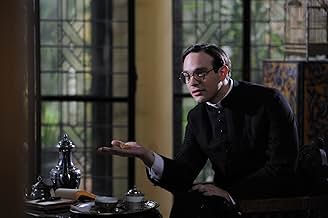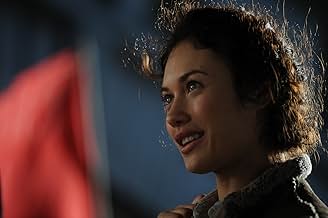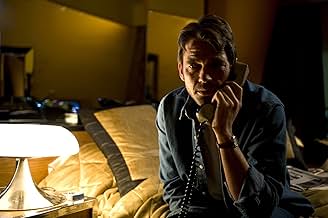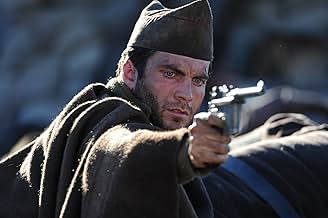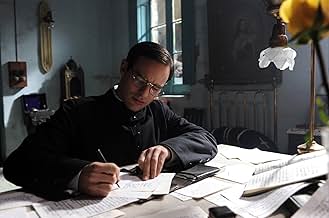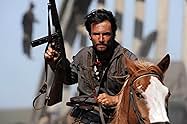CALIFICACIÓN DE IMDb
5.7/10
5.2 k
TU CALIFICACIÓN
A raíz del horror de la Guerra Civil española, un candidato a la canonización es investigado por un periodista que descubre que su propio padre tenía una conexión profunda, oscura y devastad... Leer todoA raíz del horror de la Guerra Civil española, un candidato a la canonización es investigado por un periodista que descubre que su propio padre tenía una conexión profunda, oscura y devastadora con la vida del santo.A raíz del horror de la Guerra Civil española, un candidato a la canonización es investigado por un periodista que descubre que su propio padre tenía una conexión profunda, oscura y devastadora con la vida del santo.
- Dirección
- Guionista
- Elenco
- Premios
- 2 nominaciones en total
Jordi Mollà
- Don José
- (as Jordi Mollá)
Juan Cruz Rolla Knight
- Young Josemaría
- (as Juan Cruz)
- Dirección
- Guionista
- Todo el elenco y el equipo
- Producción, taquilla y más en IMDbPro
Opiniones destacadas
Roland Joffe wakes up after two decades of bad cinema. Like a the phoenix bird he come again with interesting cinema.
The film is technically quite interesting. It starts with a short sequence that shows the deepest Spanish soul in a lost village near France. This sequence has an impeccable cut and setting, and works as introduction of the characters and situation. In my opinion the best sequence (speaking as cinema "freak"). The best thing in the film is the photography, which takes the viewer 1920s Spain.
The script is also quite interesting. Although the main character in the film is the Spanish priest Josemaria Escriva, he is not the protagonist of the story. This makes the film more interesting, as it plays with 2 people weighting their importance by their personality and their role in the story. Josemaria is the alter-ego Manolo, both are attractive persons that keep the attention of the viewer, which at the end should judge. Another success of the script is the usage of time. The main story happens in 1920 and 1930, but it is told as memories in the 80s, when the son of Manolo has to write an article about Josemaria, which is going to be canonized by the Catholic Church. Robert discovers that his father came from the same little village of Josemaria, and asks to his father about him. The answer give the title to the film "there be dragons".
Now let's go with the dragons. The makers knew that the film was going to be surrounded by dragons. Opus Dei, communism, revolution, Catholics and the Spanish Civil War... this film has all the ingredients to be a big scandal. The film has the collaboration of some members of the Opus Dei (at least 2 of the producers are) and the organization has given information and access to the documentation about Josemaria. The film also shows a period of the Spanish history which still is a taboo in this country. In Spain, still today, there are mainly 2 opposite streams: pro-franquists and pro-republicans. The film success- in my opinion- to show that as in any war there were no good and bads (which has shocked the Spanish population), that in both sides there were good and bad people, good goals but bad means. My personal opinion is that it success to show the real left of Spain, breaking with the franquist propaganda of the left as communist criminals, but also breaking the view given to Americans by Hemingway that the left in Spain was the advocate of Democracy and freedom. Maybe the film fails to show the right-side of the war, but nevertheless is- in my opinion- the best representation of the civil war that I have seen in art.
Only a non-Spanish could make such a good representation of the Civil War, and only a person like Joffe could dive enough to make such a good representation. I like Joffe because he takes a field and goes deep enough to explain the reasons. It was shown in the Mission and in Killing Fields, and here we are in front of the same Joffe. I admire him because he forgets his own point of view (I have read that he is agnostic), investigates and tries to find the keystone. Some people has said that this film is the answer of the Opus to the Da Vinci Code well I think it comes to late, because the DVC was released 5 or 6 years ago. On the other hand, if it is an answer, it works well. The DVC shows us a people that, in my opinion, is impossible that are real I don't know but I don't believe that in the World are people so crazy for example they are shown flagellating themselves (which is also shown in There Be Dragons), but in the DVC they are doing so while they know that Christ wasn't God! It makes no sense, no one does something like that to offer to a God, that they know is not God at all As this the film is full of incoherences on the other hand There Be Dragons shows both what they do (not the myth) and also explains why In my opinion this is what makes the difference between good and bad cinema (when your idea is to speak about real things).
I would also like to answer to some of the critics: please speak about the film, because people wants to know about it. If we would like to know about the Opus we could go to their web page, or just write Opus in Google. Here we come to speak about cinema. Also someone said that the rating is not trustful because all the Opus Dei's people will vote 10 well they rate 10 because they liked it as a 10, and have the same right as the people that are not members of the association IMDb works democratically, so their vote counts as well. The only problem would be if they vote without having watched the film, if the organization has commanded to vote in IMDb but well there are some 150 high votes, it doesn't seem to be the result of some strange "conspiracy" Well, my final advice is: you will hear a lot about the film. Some people will speak really well about it, some really bad, and some will just speak about the Civil War or the Opus Dei with this film is gonna be really difficult to know if it is good or not so I suggest you to watch it and make your own opinion. It maybe not one of the best films in the last 10 years, but nevertheless it's a must watch.
The film is technically quite interesting. It starts with a short sequence that shows the deepest Spanish soul in a lost village near France. This sequence has an impeccable cut and setting, and works as introduction of the characters and situation. In my opinion the best sequence (speaking as cinema "freak"). The best thing in the film is the photography, which takes the viewer 1920s Spain.
The script is also quite interesting. Although the main character in the film is the Spanish priest Josemaria Escriva, he is not the protagonist of the story. This makes the film more interesting, as it plays with 2 people weighting their importance by their personality and their role in the story. Josemaria is the alter-ego Manolo, both are attractive persons that keep the attention of the viewer, which at the end should judge. Another success of the script is the usage of time. The main story happens in 1920 and 1930, but it is told as memories in the 80s, when the son of Manolo has to write an article about Josemaria, which is going to be canonized by the Catholic Church. Robert discovers that his father came from the same little village of Josemaria, and asks to his father about him. The answer give the title to the film "there be dragons".
Now let's go with the dragons. The makers knew that the film was going to be surrounded by dragons. Opus Dei, communism, revolution, Catholics and the Spanish Civil War... this film has all the ingredients to be a big scandal. The film has the collaboration of some members of the Opus Dei (at least 2 of the producers are) and the organization has given information and access to the documentation about Josemaria. The film also shows a period of the Spanish history which still is a taboo in this country. In Spain, still today, there are mainly 2 opposite streams: pro-franquists and pro-republicans. The film success- in my opinion- to show that as in any war there were no good and bads (which has shocked the Spanish population), that in both sides there were good and bad people, good goals but bad means. My personal opinion is that it success to show the real left of Spain, breaking with the franquist propaganda of the left as communist criminals, but also breaking the view given to Americans by Hemingway that the left in Spain was the advocate of Democracy and freedom. Maybe the film fails to show the right-side of the war, but nevertheless is- in my opinion- the best representation of the civil war that I have seen in art.
Only a non-Spanish could make such a good representation of the Civil War, and only a person like Joffe could dive enough to make such a good representation. I like Joffe because he takes a field and goes deep enough to explain the reasons. It was shown in the Mission and in Killing Fields, and here we are in front of the same Joffe. I admire him because he forgets his own point of view (I have read that he is agnostic), investigates and tries to find the keystone. Some people has said that this film is the answer of the Opus to the Da Vinci Code well I think it comes to late, because the DVC was released 5 or 6 years ago. On the other hand, if it is an answer, it works well. The DVC shows us a people that, in my opinion, is impossible that are real I don't know but I don't believe that in the World are people so crazy for example they are shown flagellating themselves (which is also shown in There Be Dragons), but in the DVC they are doing so while they know that Christ wasn't God! It makes no sense, no one does something like that to offer to a God, that they know is not God at all As this the film is full of incoherences on the other hand There Be Dragons shows both what they do (not the myth) and also explains why In my opinion this is what makes the difference between good and bad cinema (when your idea is to speak about real things).
I would also like to answer to some of the critics: please speak about the film, because people wants to know about it. If we would like to know about the Opus we could go to their web page, or just write Opus in Google. Here we come to speak about cinema. Also someone said that the rating is not trustful because all the Opus Dei's people will vote 10 well they rate 10 because they liked it as a 10, and have the same right as the people that are not members of the association IMDb works democratically, so their vote counts as well. The only problem would be if they vote without having watched the film, if the organization has commanded to vote in IMDb but well there are some 150 high votes, it doesn't seem to be the result of some strange "conspiracy" Well, my final advice is: you will hear a lot about the film. Some people will speak really well about it, some really bad, and some will just speak about the Civil War or the Opus Dei with this film is gonna be really difficult to know if it is good or not so I suggest you to watch it and make your own opinion. It maybe not one of the best films in the last 10 years, but nevertheless it's a must watch.
I found this film so pretentious in its aspiration and claims, so boring badly-acted and obviously propagandist in its execution to compel me to write my first review. (When I woke up after the big ZZzzz, I mean...) What it does is to paint a glorified history of the "Saint" and the birth of the Opus Dei, in pure ecclesiastic style, never mind historic accuracy.
It would still be all OK to me if the film had any cinematographic merits, if the acting was good, if dialogue was credible But it really isn't (e.g., "I wasn't allowed to play with Jose Maria anymore, my father thought poverty was contagious... My dad had more money, ... but Jose Maria had more dad." Excuse me! And also: "Like or not, most young men were celibate, at least as a priest you got paid for it". What? Excuse me!)
So, my advice is: really don't waste your two hours trying to stay awake during this: if you're interested in the Opus Dei and Escriva De Balaguer, find a more serious and reliable source, if you only want to go the movies, find a better film. This one should stay in the religious circles were it belongs, not in theatres.
It would still be all OK to me if the film had any cinematographic merits, if the acting was good, if dialogue was credible But it really isn't (e.g., "I wasn't allowed to play with Jose Maria anymore, my father thought poverty was contagious... My dad had more money, ... but Jose Maria had more dad." Excuse me! And also: "Like or not, most young men were celibate, at least as a priest you got paid for it". What? Excuse me!)
So, my advice is: really don't waste your two hours trying to stay awake during this: if you're interested in the Opus Dei and Escriva De Balaguer, find a more serious and reliable source, if you only want to go the movies, find a better film. This one should stay in the religious circles were it belongs, not in theatres.
A decent sketch. About war, friendship, courage and compromises, about faith, jealousy and parenthood. Decent, interesting for actors more than for story, obvious answer of Opus Dei against propaganda created by Da Vinci Code, it is a beautiful sketch of tragic events.
Nice cinematography. Weak script, Weak special effects. some dark scenes that didn't have to be.
The music, oh my horror, what can I say about the music. The swelling crescendos,everywhere, the loud volume, drowning out the dialog, and the most inappropriate music at the most inappropriate times, oh my horror, the most horrible music. After a half hour, I was left to myself to watch the thing, the music chased all the others away. Did I mention the music, oh my horror, the miserable horrible music, wrecking what could have been.
In the last half of the movie, I could see the actors were all tired of this, their efforts were drawn and tired, they had succumbed, they had had enough, long before the audience collapsed.
I'm sure the cutting room floor was littered with performances that were absolutely horrible, the actors were sick of this project and just wanted, no needed, to run away.
In Blu-Ray, at a cost of $2.99, cheaper than a bad movie at the theatre and I could at least drown myself in beer.
The music, oh my horror, what can I say about the music. The swelling crescendos,everywhere, the loud volume, drowning out the dialog, and the most inappropriate music at the most inappropriate times, oh my horror, the most horrible music. After a half hour, I was left to myself to watch the thing, the music chased all the others away. Did I mention the music, oh my horror, the miserable horrible music, wrecking what could have been.
In the last half of the movie, I could see the actors were all tired of this, their efforts were drawn and tired, they had succumbed, they had had enough, long before the audience collapsed.
I'm sure the cutting room floor was littered with performances that were absolutely horrible, the actors were sick of this project and just wanted, no needed, to run away.
In Blu-Ray, at a cost of $2.99, cheaper than a bad movie at the theatre and I could at least drown myself in beer.
"There Be One Draggin' Movie" is more like it... I respect the tragedy of the Spanish Civil War and the hatred for Franco but pullllllease... get to the point... I don't want to feel EVERY bullet... the ones that should have been meant for me.... ugh!
I liked that the film reflected the pain, confusion, and agony of war but it's not the first time something has been made of the topic... the movie goes on and on and on switching between battles scenes, treachery, religious strength and doubt, love... thank God for no cheap sex scenes... maybe I just don't get it but the wringing of hands can only be put up with for so long... and NOT for two hours.... aaaaaargh!
I liked that the film reflected the pain, confusion, and agony of war but it's not the first time something has been made of the topic... the movie goes on and on and on switching between battles scenes, treachery, religious strength and doubt, love... thank God for no cheap sex scenes... maybe I just don't get it but the wringing of hands can only be put up with for so long... and NOT for two hours.... aaaaaargh!
¿Sabías que…?
- TriviaThe title comes from the phrase "here be dragons" which was written on old maps to denote dangerous or uncharted areas.
- ErroresThe sub machine gun that the rebel leader Oriol takes from the wrecked combat car to pose with Ildiko is a Thompson M1 or M1-A1, as shown by the charging handle on the right and the simplified rear sight. This was not introduced until 1942, six years after the events in the movie.
- Versiones alternativasBecause of poor box-office performance in 2011, the film was re-edited and re-released in the USA in 2012, under the title "There Be Dragons: Secrets of Passion". This new version is shorter (106 minutes) and has a new music scored by Robert Folk.
- ConexionesFeatured in Saint of the Ordinary: The Making of There Be Dragons (2011)
Selecciones populares
Inicia sesión para calificar y agrega a la lista de videos para obtener recomendaciones personalizadas
- How long is There Be Dragons?Con tecnología de Alexa
Detalles
- Fecha de lanzamiento
- Países de origen
- Sitios oficiales
- Idioma
- También se conoce como
- There Be Dragons
- Locaciones de filmación
- Productoras
- Ver más créditos de la compañía en IMDbPro
Taquilla
- Presupuesto
- USD 36,000,000 (estimado)
- Total en EE. UU. y Canadá
- USD 1,069,334
- Fin de semana de estreno en EE. UU. y Canadá
- USD 705,537
- 8 may 2011
- Total a nivel mundial
- USD 4,372,642
- Tiempo de ejecución
- 2h 2min(122 min)
- Color
- Mezcla de sonido
- Relación de aspecto
- 2.35 : 1
Contribuir a esta página
Sugiere una edición o agrega el contenido que falta








